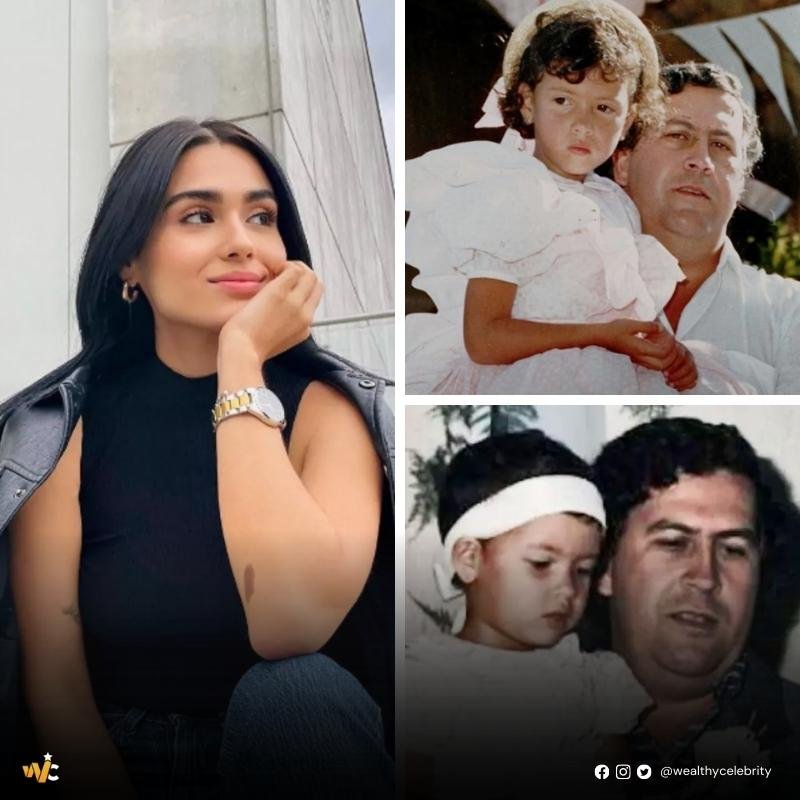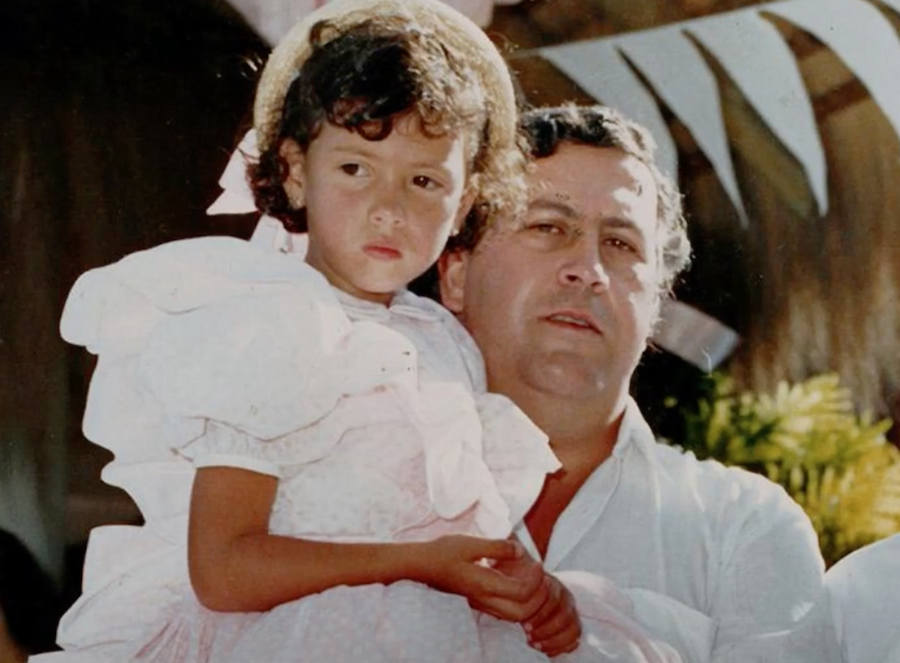Untold Story: Manuela Escobar - Pablo's Daughter's Life Today
What happens when your father is one of the most notorious criminals in history? Manuela Escobar's life, inextricably linked to the infamy of her father, Pablo Escobar, has been one of both unimaginable privilege and profound trauma. Though she bears the weight of her father's legacy, she has remained untouched by the criminal world, a stark contrast to the empire he built.
Manuela Escobar, the only daughter and youngest child of the infamous Colombian drug lord Pablo Escobar, was born into a world of unimaginable wealth and luxury. Her early life was characterized by extravagance and privilege, shielded from the brutal reality of her father's profession. However, this gilded cage shattered with Pablo Escobar's death in 1993, forcing Manuela and her family to flee Colombia and seek refuge in Argentina, where they adopted new identities in an attempt to escape the long shadow of their past. Manuela embarked on a new life under the name Juana Manuela Marroquin Santos.
| Full Name | Juana Manuela Marroqun Santos (formerly Manuela Escobar) |
| Date of Birth | May 25, 1984 |
| Place of Birth | Colombia |
| Zodiac Sign | Taurus |
| Parents | Pablo Escobar (father), Maria Victoria Henao (mother) |
| Siblings | Sebastin Marroqun (formerly Juan Pablo Escobar Henao) |
| Early Life | Lived a lavish and sheltered life during the height of Pablo Escobar's drug empire. Home-schooled instead of attending public school. |
| Life After 1993 | Fled to Argentina with her family after her father's death. Changed her name to Juana Manuela Marroqun Santos. Has maintained a low profile, largely avoiding media attention. |
| Public Persona | Kept out of the public eye. Her brother, Sebastin Marroqun, has been more vocal about their father's legacy. |
| Challenges | Reportedly suffered from depression and suicidal thoughts due to the constant fear of retaliation from her father's enemies. |
| Current Whereabouts | Details of her current life are largely unknown, reflecting her desire for privacy. |
| Reference | Biography.com |
Born on May 25, 1984, Manuela's early childhood was defined by the dichotomy of immense wealth and ever-present danger. While children her age attended school and played without a care, Manuela was home-schooled for security reasons. Her father, despite his brutal reputation, doted on her. Stories abound of his extravagant displays of affection, including tales of burning money to keep her warm while on the run. These acts, while demonstrating a twisted form of paternal love, also highlight the surreal and dangerous world in which she was raised. It was a childhood where the line between reality and nightmare was perpetually blurred.
Growing up in the shadow of Pablo Escobar meant a life lived under constant surveillance and the threat of violence. Every aspect of her life was dictated by the need for security. This existence, far removed from the normalcy of other children, undoubtedly left an indelible mark on her psyche. While her brother, Sebastin Marroqun, has chosen to speak out against his father's legacy and the violence it wrought, Manuela has opted for a life of quiet anonymity. Her silence, perhaps, speaks volumes about the trauma she endured and her desire to escape the long reach of her father's notoriety.
The year 1993 marked a turning point in Manuela's life. On December 2nd, Pablo Escobar was killed in a police operation, bringing an end to his reign of terror but also shattering Manuela's world. At just nine years old, she was forced to confront the reality of her father's actions and the consequences they had for her family. The death of Escobar did not erase the past; instead, it intensified the danger and forced them to flee. They became refugees, haunted by the legacy of a man who was both a loving father and a ruthless criminal.
The family's escape to Argentina was fraught with challenges. They sought to rebuild their lives under new identities, but the shadow of Pablo Escobar continued to follow them. Adjusting to a life of anonymity after years of unimaginable wealth and power proved difficult. The family faced financial hardships and legal battles, constantly reminded of their past. Manuela, now Juana Manuela Marroqun Santos, had to navigate the complexities of adolescence while grappling with the trauma of her childhood and the stigma associated with her family name.
- Decoding Tollywood The 5 Movie Rules Telugu 2024 Explained
- Aagmaalgives Scam Truth Alternatives Revealed
While Sebastin Marroqun has emerged as a public figure, offering insights into his father's life and condemning the drug trade, Manuela has deliberately chosen to remain out of the spotlight. Little is known about her life in Argentina. She has managed to maintain an extraordinary level of privacy, a testament to her determination to forge her own path, independent of her father's legacy. This silence, however, has fueled speculation and intrigue about her life and experiences. What does she remember of her childhood? How has she coped with the weight of her father's actions? These questions remain unanswered, adding to the mystique surrounding Manuela Escobar.
In 2015, Sebastin Marroqun revealed that his sister lived in constant fear of retaliation from her father's enemies. He also disclosed that she had suffered from bouts of depression and had even attempted suicide, a stark reminder of the psychological toll of her upbringing. These revelations offer a glimpse into the inner turmoil that Manuela has faced, highlighting the challenges of escaping the shadow of her father's legacy. Her struggles underscore the profound impact that violence and trauma can have on a young life, even years after the events have transpired.
Despite the darkness of her past, Manuela Escobar represents a story of survival and resilience. She is a woman who has managed to forge her own identity in the face of extraordinary adversity. While her father's name will forever be associated with violence and drug trafficking, Manuela has chosen a different path. She is a survivor, a woman who has sought to rebuild her life in anonymity and peace. Her story, though largely untold, is a testament to the human capacity for resilience and the enduring power of hope, even in the darkest of circumstances.
Manuela Escobar's birthdate is documented as both April 25, 1985, and May 25, 1984. The May 25, 1984, date appears to be more consistently referenced across various sources, suggesting this is the accurate date. This discrepancy highlights the challenges of piecing together an accurate picture of her life, given her desire for privacy and the sensationalism that often surrounds the Escobar family.
Growing up, Manuela experienced a life of stark contrasts. While other children attended regular schools, Manuela was educated at home, a necessary precaution given the immense security risks associated with her father's activities. This isolated upbringing, while intended to protect her, undoubtedly shaped her social development and her understanding of the world. She was shielded from the everyday realities of life, living in a bubble of wealth and privilege, surrounded by bodyguards and constantly aware of the danger that lurked outside.
Her father's affection for her was legendary. Pablo Escobar, despite his ruthless reputation, was known to be a doting father who indulged Manuela's every whim. One famous anecdote recounts how he burned two million dollars in cash to keep her warm when the family was on the run and seeking refuge in the mountains. This story, while shocking in its extravagance, illustrates the depth of his affection for her and the lengths to which he would go to protect her comfort and well-being. It also serves as a stark reminder of the vast wealth he controlled and the moral compromises he made in its pursuit.
The extravagant gifts and lavish lifestyle could not, however, shield Manuela from the brutal reality of her father's world. She was aware of the violence and the danger that surrounded her family. She witnessed firsthand the fear and the chaos that Pablo Escobar's actions created. This exposure to violence at a young age undoubtedly had a profound impact on her psychological development, contributing to the anxiety and depression she would later experience.
The fall of Pablo Escobar's empire was swift and brutal. As law enforcement agencies and rival cartels closed in, the family was forced to live a life on the run, constantly moving from one safe house to another. This period of upheaval and uncertainty further traumatized Manuela, disrupting her sense of security and stability. The constant fear of capture or death took a heavy toll on her emotional well-being.
Following Pablo Escobar's death, the family sought refuge in Argentina, hoping to escape the violence and the stigma associated with their name. They changed their identities, adopting the surname Marroqun Santos in an attempt to start a new life. However, their past continued to haunt them. They faced legal challenges and financial difficulties, as the Argentine authorities investigated their assets and scrutinized their activities. The shadow of Pablo Escobar continued to loom large, preventing them from fully escaping their past.
While Manuela has remained largely out of the public eye, her brother, Sebastin Marroqun, has become a vocal critic of his father's legacy. He has written books and given interviews, offering insights into the life of Pablo Escobar and condemning the violence and destruction caused by the drug trade. Sebastin has also sought to reconcile with the victims of his father's actions, offering apologies and working to promote peace and reconciliation in Colombia. His efforts have been met with mixed reactions, but he has undoubtedly played a role in shaping the narrative surrounding Pablo Escobar and his family.
In contrast to her brother's public engagement, Manuela's silence speaks volumes. Her decision to remain out of the spotlight suggests a deep desire for privacy and a desire to distance herself from her father's legacy. It is possible that she has chosen to focus on healing and rebuilding her life in anonymity, away from the scrutiny and judgment of the outside world. Her silence may also be a reflection of the trauma she has experienced and a reluctance to relive the painful memories of her past.
Despite the challenges she has faced, Manuela Escobar's story is one of resilience and survival. She is a woman who has endured unimaginable hardship and has emerged as a survivor. While her father's name will forever be associated with violence and drug trafficking, Manuela has chosen a different path. She has sought to create a life of peace and anonymity, away from the shadow of her father's legacy. Her story is a testament to the human capacity for resilience and the enduring power of hope, even in the face of profound adversity.
The details of Manuela Escobar's current life remain shrouded in mystery. It is believed that she continues to live in Argentina, under the name Juana Manuela Marroqun Santos. She has managed to maintain an extraordinary level of privacy, avoiding media attention and living a quiet life. What she does for a living, what her personal relationships are like, and what her hopes and dreams are for the future remain largely unknown. This mystery only adds to the fascination surrounding her story.
Manuela Escobar's story serves as a cautionary tale about the devastating consequences of violence and the enduring impact of trauma. It is a reminder that even those who are born into privilege and wealth can be deeply affected by the actions of their parents. Her life is a testament to the challenges of escaping the shadow of a notorious past and the importance of finding peace and healing in the aftermath of trauma. While her father's legacy will forever be a part of her story, Manuela Escobar has ultimately chosen to define her own life, independent of his infamy. She stands as a symbol of resilience and the enduring power of the human spirit to overcome adversity.
The fascination with Pablo Escobar continues to this day, with numerous books, films, and television shows chronicling his life and his criminal empire. However, the story of his daughter, Manuela Escobar, remains largely untold. Her life, though shaped by her father's actions, is a unique and compelling story in its own right. It is a story of survival, resilience, and the enduring power of hope, even in the darkest of circumstances. As the world continues to grapple with the legacy of Pablo Escobar, it is important to remember the human cost of violence and the importance of offering compassion and understanding to those who have been affected by it, including his daughter, Manuela Escobar.
The life of Manuela Escobar is a complex and multifaceted story that defies easy categorization. She is not simply the daughter of a notorious drug lord; she is a survivor, a woman who has endured unimaginable hardship and has emerged with a remarkable degree of resilience. Her story is a reminder that even in the midst of darkness, hope can endure, and that even those who are born into difficult circumstances can find a path towards peace and healing. Manuela Escobar's story is a testament to the enduring power of the human spirit and the importance of offering compassion and understanding to all those who have been affected by violence and trauma.
Despite the extraordinary circumstances of her life, Manuela Escobar is, in many ways, an ordinary person. She has faced the same challenges as many other people, including the loss of loved ones, financial difficulties, and mental health struggles. However, she has faced these challenges under the weight of a notoriety and scrutiny that few can imagine. Her ability to maintain her privacy and to rebuild her life in the face of such adversity is a testament to her strength and her determination.
While the world may never fully know the details of Manuela Escobar's life, her story serves as a powerful reminder of the human cost of violence and the importance of empathy and understanding. She is a survivor, a woman who has chosen to forge her own path, independent of her father's legacy. Her story is a testament to the enduring power of the human spirit and the ability to find hope and healing, even in the darkest of circumstances.
It's important to note that while some sources suggest Manuela Escobar might be a businesswoman, there's little verifiable information to support this. Most accounts emphasize her efforts to remain private and avoid public life. Her brother, Sebastin Marroqun, has been the more public figure, actively discussing their family's history and working to reconcile with victims of his father's actions.
The conflicting information regarding Manuela's birthdate (April 25, 1985 vs. May 25, 1984) further underscores the difficulty in obtaining accurate details about her life. This ambiguity highlights the challenges of reconstructing the life of someone who has actively sought to avoid public attention.
Even with the limited information available, it's clear that Manuela Escobar's life has been profoundly shaped by her father's legacy. Her story is a reminder of the far-reaching consequences of violence and the enduring impact of trauma on individuals and families. It's a story that deserves to be told with sensitivity and respect, recognizing the complexities of her experience and her right to privacy.
Considering the immense wealth Pablo Escobar amassed, the financial struggles Manuela and her family faced after his death are noteworthy. This suggests that much of his fortune was either seized by authorities, lost, or inaccessible to them. It also highlights the vulnerability they experienced despite their previous affluence.
While Sebastin Marroqun has publicly apologized for his father's actions, it's unknown whether Manuela shares the same sentiments publicly. Her silence on the matter could be interpreted in various ways, from a desire to avoid further scrutiny to a complex mix of emotions towards her father.
The fact that Manuela was homeschooled from a young age illustrates the extraordinary security measures taken to protect her. This isolated upbringing likely had a significant impact on her social development and her understanding of the world.
The anecdote about Pablo Escobar burning money to keep Manuela warm is a powerful symbol of his extravagant wealth and his devotion to her. However, it also represents the moral compromises he made in acquiring that wealth.
Despite the lavish lifestyle she experienced as a child, Manuela's life has been marked by trauma, fear, and loss. This underscores the point that material wealth cannot always compensate for the emotional and psychological toll of violence and instability.
The decision to change their names and flee to Argentina reflects the desperation of Manuela and her family to escape the long shadow of Pablo Escobar's legacy.
The fact that Manuela reportedly suffered from depression and attempted suicide highlights the deep psychological impact of her father's actions and the challenges she has faced in coping with her past.
While Manuela Escobar is not a name you will find in history books, her story is an important part of the larger narrative of Pablo Escobar and the Colombian drug trade. It serves as a reminder of the human cost of violence and the enduring power of resilience.
In conclusion, Manuela Escobar's life is a complex and compelling story that deserves to be told with sensitivity and respect. While she has sought to remain out of the public eye, her experiences offer valuable insights into the human cost of violence and the challenges of escaping a troubled past. Her story is a testament to the enduring power of the human spirit and the ability to find hope and healing, even in the darkest of circumstances. She lived a lavish and pampered life until his death in 1993, after which she fled with her family to argentina and changed her name.
- Decoding Tollywood The 5 Movie Rules Telugu 2024 Explained
- Hdmovieshub Is It Safe Risks Amp Legal Alternatives Guide

Manuela Escobar Biography Facts, Childhood, Family Life & Achievements

Manuela Escobar 2024 The Life And Legacy Of Pablo Escobar's Daughter

What Happened To Manuela Escobar, Pablo Escobar's Daughter?